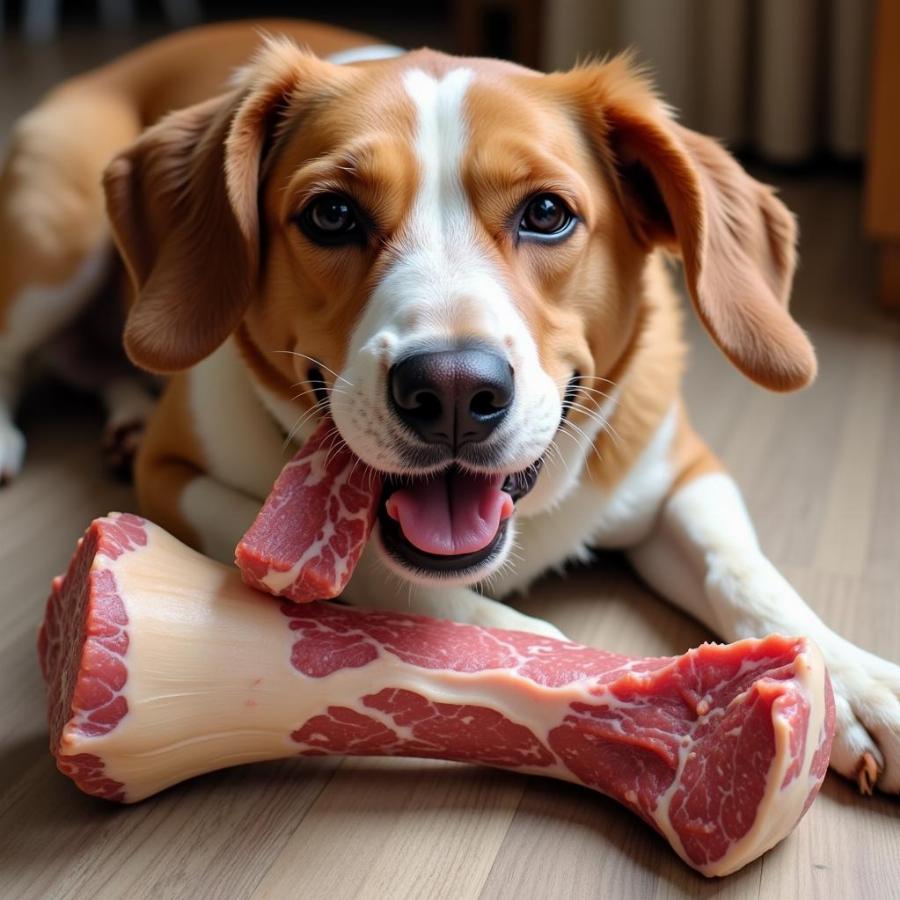Broth bones for dogs are a popular treat, often touted for their health benefits and flavor appeal. But are they truly safe and beneficial for our canine companions? Understanding the nuances of offering broth bones to your dog is crucial to ensuring their well-being. This comprehensive guide will delve into the benefits and risks of broth bones, offering practical advice to help you make informed decisions about incorporating them into your dog’s diet.
The Nutritional Perks of Broth Bones for Dogs
Bone broth, often made by simmering bones for an extended period, can be a source of certain nutrients like collagen, chondroitin, and glucosamine, which can support joint health. For dogs with no teeth or senior dogs, the soft, easily digestible marrow found in broth bones can be a good source of calories and essential fatty acids. Additionally, the enticing aroma and flavor of broth can be a great way to stimulate a dog’s appetite, particularly for picky eaters or those recovering from illness.
Navigating the Risks: Cooked vs. Raw Bones
The biggest concern with broth bones for dogs stems from the potential for splintering, especially with cooked bones. Cooked bones become brittle and can easily splinter, posing a serious choking hazard and potentially causing damage to the digestive tract. Raw bones, while generally less prone to splintering, can still present risks if they are too large or if your dog is an aggressive chewer. It’s important to note that cooked lamb bones, ham bones, and other weight-bearing bones are particularly dangerous due to their density and tendency to splinter. If you’re considering offering broth to your dog, understanding the difference between safe and unsafe bone types is essential.
Can Dogs Eat Chicken Broth? A Closer Look
Chicken broth can be a healthy and flavorful addition to a dog’s diet in moderation. It’s important to choose low-sodium, unsalted versions and avoid broths containing onions, garlic, or other ingredients toxic to dogs. Chicken broth can be a hydrating treat, particularly during warmer months, and can even be used to entice picky eaters or administer medication. However, it’s crucial to ensure that any chicken bones have been completely removed from the broth before offering it to your dog.
Broth for Dogs: Making it at Home
Making broth for dogs at home allows you to control the ingredients and ensure its safety. Use appropriate bones, such as raw beef knuckle bones or marrow bones, and simmer them for an extended period to extract the nutrients. Remember to always supervise your dog when they are consuming broth or any bone product. And importantly, never offer cooked bones of any kind.
Choosing the Right Bones: Size and Type Matter
Selecting the right type and size of bone for your dog is paramount to their safety. Avoid weight-bearing bones, especially cooked ones, and opt for softer, more pliable options like marrow bones. The bone should be appropriately sized for your dog to prevent choking hazards. Always supervise your dog while they are enjoying a bone and remove it when it becomes small enough to be swallowed whole. If you are unsure about what type of bone is appropriate for your dog, consult with your veterinarian.
 Dog Chewing Safe Bone
Dog Chewing Safe Bone
What if My Dog Swallows a Cooked Bone?
If your dog swallows a cooked bone, seek immediate veterinary attention. Signs of a potential problem include vomiting, diarrhea, abdominal pain, or difficulty defecating. Early intervention is crucial to prevent serious complications.
Conclusion: Broth Bones for Dogs – A Careful Approach
Broth bones can offer some nutritional benefits for dogs, but they also come with inherent risks. By understanding these risks and taking appropriate precautions, such as choosing the right type and size of bone, offering only raw bones, and always supervising your dog, you can help ensure your furry friend enjoys this treat safely. Remember to consult with your veterinarian if you have any questions or concerns about incorporating broth bones into your dog’s diet.
FAQ:
- Are cooked bones ever safe for dogs? No, cooked bones become brittle and can easily splinter, posing a serious choking hazard.
- Can I give my dog chicken bones? No, chicken bones, especially cooked ones, are extremely dangerous for dogs.
- What should I do if my dog swallows a bone splinter? Contact your veterinarian immediately.
- What are the benefits of bone broth for dogs? Bone broth can be a source of collagen, chondroitin, and glucosamine.
- Can I add vegetables to my homemade dog broth? Yes, certain vegetables like carrots and celery can be added.
- How long should I simmer bones to make broth? Simmer for at least 12-24 hours for optimal nutrient extraction.
- Can puppies have broth bones? It’s best to consult your veterinarian before giving broth bones to puppies.
Other Questions You Might Have:
- Can dogs have cooked ham bones?
- Are beef bones safe for dogs?
- What are the best treats for dogs with no teeth?
For further reading, check out our articles on can dogs eat chicken broth, dogs with no teeth, and broth for dogs. We also have information on can dogs eat cooked lamb bones and can dogs have cooked ham bones.
Beaut Dogs is your trusted source for all things canine, offering expert advice and valuable resources on dog breeds, care, and nutrition. When you need expert guidance, reach out to us at Email: [email protected] for detailed and accurate information from Beaut Dogs. Visit us today at https://beautdogs.com to discover the wonderful world of dogs and learn how to care for them.